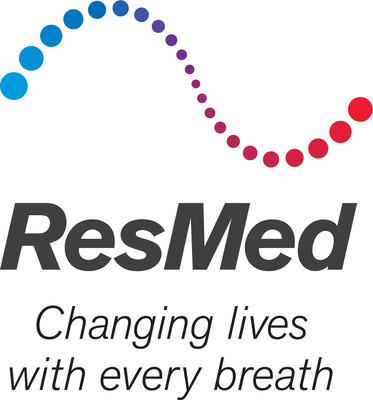Landmark Year in Sleep: Leader in Sleep and Respiratory Medicine Highlights Top Five Sleep Apnea Research Findings
SAN DIEGO, March 14, 2014 /PRNewswire/ -- To coincide with today's World Sleep Day, ResMed (NYSE: RMD), an innovator and pioneer in developing solutions for treating sleep-disordered breathing and other respiratory conditions, highlights its pick for the top five research discoveries about sleep apnea from the past year. Together, they paint an alarming picture: sleep apnea is on the rise and linked to sudden cardiac death, slower recovery from heart attacks, cancer, and high blood pressure.
1. Sleep apnea is linked to higher rates of cancer
Obstructive sleep apnea (OSA) deprives the body of oxygen (also known as hypoxia), which can lead to higher rates of cancer in patients under the age of 65. OSA occurs when the throat relaxes during sleep and blocks the airway, causing a person to snore and/or stop breathing until the brain triggers a wake-up response and the body struggles to gasp for air.
[Association between Obstructive Sleep Apnea and Cancer Incidence in a large multicenter Spanish Cohort (Campos-Rodriguez et al., 2013 Am J of Respir Crit Care Med)]
2. Sleep apnea increases risk of sudden cardiac death
"Oxygen is our lifeline," said Adam Benjafield, Ph.D., ResMed vice president of Medical Affairs. "When our bodies are deprived of oxygen during episodes of sleep apnea, a long list of negative health consequences can occur. The research shows that those suffering from sleep apnea are at a greater risk of a sudden cardiac death, plain and simple."
[Obstructive sleep apnea and the risk of sudden cardiac death: A longitudinal study of 10,701 adults. (Gami et al., 2013 J Am Coll Cardiol.)]
3. Untreated sleep apnea slows recovery from heart attacks
"This study is important because it demonstrates that if you have a heart attack and also have untreated sleep apnea, your heart will not heal as effectively as the heart of someone without sleep apnea, and recovery will be impaired," said Benjafield.
[Impact of sleep-disordered breathing on myocardial salvage and infarct size in patients with acute myocardial infarction. (Buchner et al., 2013 Eur Heart J.)]
4: Treatment for sleep apnea can reduce blood pressure
Treatment of sleep apnea with continuous positive air pressure (CPAP) therapy reduces blood pressure in sleep apnea patients. Widely accepted as the gold standard, CPAP therapy involves wearing a mask or nasal pillows system connected to a small portable airflow generator that delivers air at positive pressure, creating an air splint to keep the airway open.
[Effect of continuous positive airway pressure (CPAP) on blood pressure in patients with obstructive sleep apnea/hypopnea. A systematic review and meta-analysis. (Fava et al., 2013 Chest)]
5: Sleep apnea is increasing among men and women — up to 1 in 4 adults
The latest data on the prevalence of sleep apnea in adults shows that the rates have gone up substantially over the last two decades. Among adults 30-70 years of age, it is estimated that 13 percent of men and 6 percent of women have moderate to severe sleep apnea, compared to the earlier results (9 percent of men and 4 percent of women). In addition, the number of those with at least mild sleep apnea has jumped for both men (26 to 34 percent) and women (13 to 17 percent).
[Increased Prevalence of Sleep-Disordered Breathing in Adults. (Peppard et al., 2013 Am J Epidemiol.)]
Together, the research findings demonstrate that untreated, sleep apnea can severely affect quality of life, health, and mortality. Sleep apnea continues to be strongly linked to a long list of life-threatening, chronic diseases such as cancer, stroke, heart failure, hypertension, diabetes, obesity, and coronary heart disease as these and other studies continue to reveal. Untreated sleep apnea also has an association with depression, especially in women, and daytime drowsiness which increases the risk of accidents in the workplace and while driving.
Education remains a key obstacle to effective treatment. Studies indicate that as many as 85 percent of people who have sleep apnea remain undiagnosed and untreated.
"It's not just a question of more sleep," said Benjafield. "It's a question of better quality sleep, which translates directly to better health. The good news is that getting tested and receiving treatment for sleep apnea is easier than ever."
If you suspect that you or someone in your family might have sleep apnea, talk to a doctor or medical professional. Typical symptoms include constant tiredness, poor concentration, morning headaches, depressed mood, night sweats, weight gain, lack of energy, forgetfulness, sexual dysfunction, and frequent urination at night. For more information, or to take a short sleep quiz, visit www.WakeUpToSleep.com.
About ResMed
ResMed changes lives by developing, manufacturing and distributing medical equipment for treating, diagnosing, and managing sleep-disordered breathing, COPD, and other chronic diseases. We develop innovative products and solutions to improve the health and quality of life of those who suffer from these conditions, and we work to raise awareness of the potentially serious health consequences of untreated sleep-disordered breathing. For more information on ResMed, visit www.resmed.com.
Contacts:
For News Media
Troy Anderson
Manager, Global Corporate Communications
O: 858-836-6772
news@resmed.com
For Investors
David Pendarvis
Chief Administrative Officer and Global
General Counsel
O: 858-836-5000
investor.relations@ResMed.com
Logo - https://photos.prnewswire.com/prnh/20140310/LA79234LOGO-a
SOURCE ResMed Inc.
Released March 14, 2014

